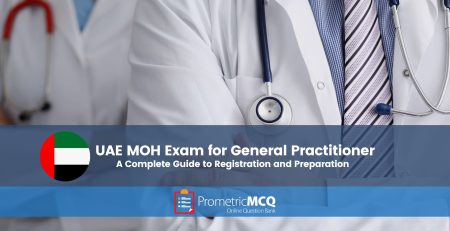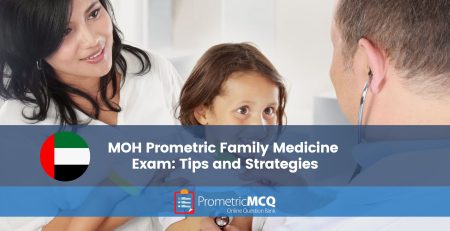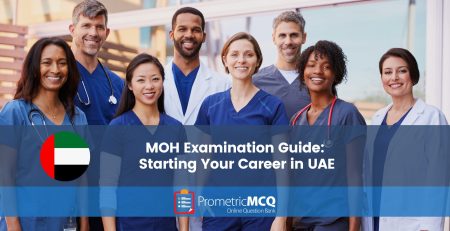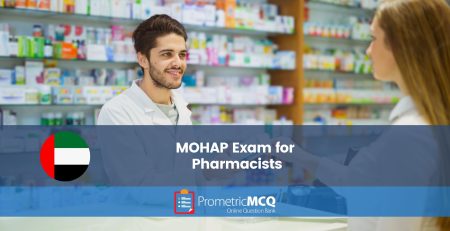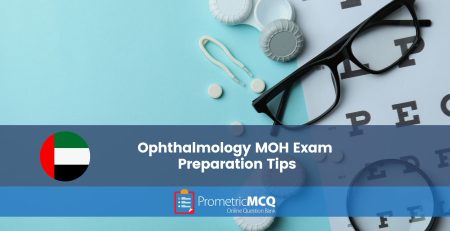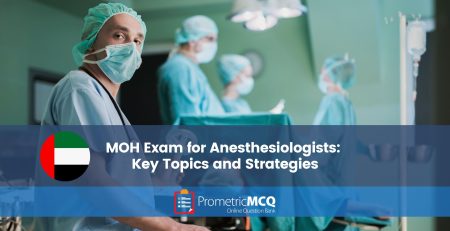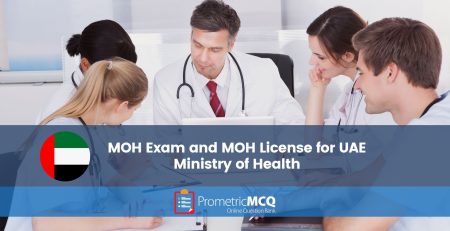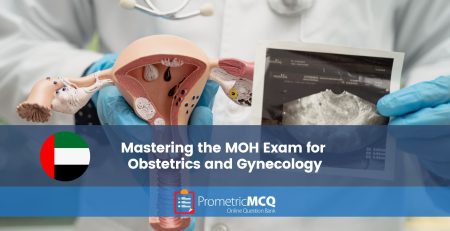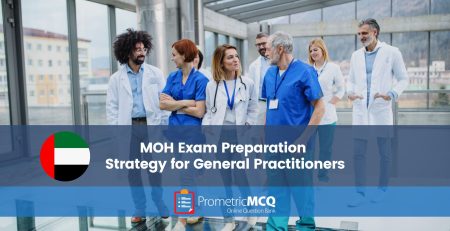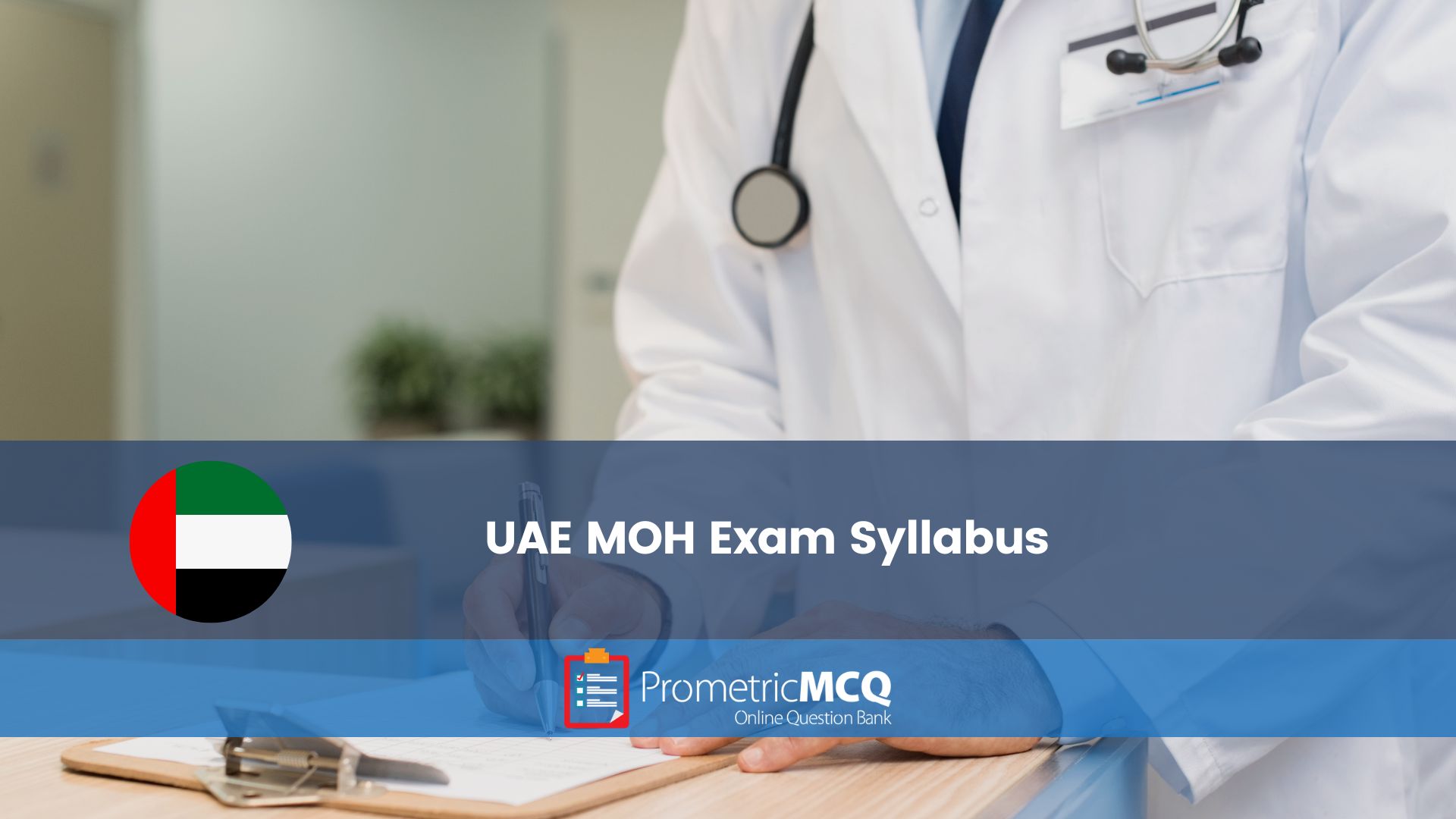
UAE MOH Exam Syllabus
Webmaster2024-03-30T10:18:01+00:00Are you gearing up for the MOH exam, feeling anxious about the MOH Exam syllabus, or unsure about where to start your study journey? Picture this – you, confidently immersed in the details of the MOH exam syllabus, breezing through the topics with ease and clarity. It’s all about understanding the roadmap to success, and that’s exactly what this blog aims to provide – a comprehensive overview and study guide to ace the MOH exam like a pro.
📘 Dive into the essentials: Get a breakdown of the MOH exam pattern, a sneak peek into the topics covered, and valuable insights into how to navigate the exam maze effectively.
👩⚕️ Aim for success: Uncover preparation tips tailored to help medical professionals like yourself excel in the MOH exam and secure that coveted license in the UAE.
💡 Proven strategies and resources await: Explore a treasure trove of study aids and guidance to boost your confidence and enhance your chances of acing the exam with flying colors.
Ready to embark on a journey of knowledge and preparation? Let’s demystify the MOH exam syllabus together and set you on the path to success!
Table of Contents
ToggleIntroduction to MOH Exam
The MOH (Ministry of Health) Exam holds immense significance for medical professionals seeking licensure in the United Arab Emirates (UAE). It serves as a crucial step towards obtaining a professional license, allowing individuals to practice medicine in the UAE. Understanding the exam’s syllabus, pattern, and preparation strategies is essential for success.
The MOH Exam is part of the rigorous licensing process implemented by the UAE’s Ministry of Health. This process ensures that medical professionals meet the country’s standards and possess the necessary qualifications to provide excellent healthcare services. By obtaining a professional license through the MOH Exam, medical professionals gain numerous benefits, such as improved career prospects, job security, and opportunities for growth and specialization.
To excel in the MOH Exam, candidates must demonstrate their comprehensive knowledge, clinical abilities, and aptitude for the practice of medicine. The exam evaluates theoretical understanding, clinical skills, and competence in various medical disciplines.
In the following sections, we will delve deeper into the key details of the MOH Exam, including the exam date, pattern, fees, eligibility criteria, and the different subject areas covered. This guide aims to provide aspiring medical professionals with the necessary information and resources to effectively prepare and succeed in the MOH Exam, thereby obtaining a coveted medical license in the UAE.
Remember, thorough preparation and a deep understanding of the exam’s syllabus are crucial for achieving a high score. Let’s explore the MOH Exam in detail and embark on a successful journey towards becoming a licensed medical professional in the UAE.
Professional Licensure
Obtaining a professional license is a vital step for medical professionals looking to practice in the United Arab Emirates (UAE). This license serves as proof of their competence and expertise, allowing them to provide quality healthcare services to the public. Here, we will explore the significance of professional licensure and highlight the benefits it offers to medical professionals in the UAE.
- Ensuring Competence and Expertise: Gaining a professional license demonstrates that medical professionals have met the rigorous standards set by the Ministry of Health (MOH) in the UAE.
The licensing process involves evaluating their qualifications, experience, and knowledge to ensure they possess the necessary skills to provide safe and effective care. By obtaining a license, medical professionals showcase their competence and assure patients that they are receiving care from qualified individuals.
- Enhancing Professional Opportunities: A professional license opens up a world of opportunities for medical professionals in the UAE. With a valid license, they have the freedom to work in various healthcare settings, including government hospitals, private clinics, and specialized centers.
This versatility provides them with the chance to explore their interests, gain diverse experiences, and grow professionally.
- Building Trust and Credibility: A professional license serves as a testament to a medical professional’s credibility and trustworthiness. It assures patients that the individual has undergone a rigorous evaluation process and adheres to the highest standards of ethics and professionalism.
This trust is crucial in establishing strong doctor-patient relationships and contributing to the overall satisfaction and well-being of patients.
- Legal Compliance and Patient Safety: A professional license ensures that healthcare providers operate within the legal framework of the UAE. It helps regulate the practice of medicine and ensures that medical professionals adhere to specific guidelines and policies.
By maintaining strict standards, the MOH prioritizes patient safety, protects public health, and safeguards the integrity of the healthcare system.
- Access to Exclusive Opportunities: A professional license in the UAE grants medical professionals access to various professional development opportunities. They can attend conferences, workshops, and seminars that enable them to stay updated with the latest advancements in their respective fields.
Continuing education and training programs not only enhance their knowledge but also contribute to their overall professional growth and personal development.
In conclusion, obtaining a professional license is of utmost importance for medical professionals in the UAE. It signifies their competence, enhances their professional opportunities, and builds trust and credibility among patients. By completing the licensure process, medical professionals ensure compliance with legal regulations, prioritize patient safety, and gain access to exclusive opportunities for growth and development.
Overview of the MOH Exam
The Ministry of Health (MOH) Exam is a crucial step for medical professionals seeking licensure in the United Arab Emirates (UAE). This comprehensive exam assesses the competencies and knowledge required to practice medicine in the UAE. To help you prepare effectively, it is essential to have a clear understanding of the exam details.
MOH Exam Date and Pattern:
The MOH Exam is typically held multiple times throughout the year, allowing candidates to choose a suitable date for their convenience. It follows a computer-based format and consists of multiple-choice questions. The exact number of questions and duration may vary depending on the profession and the level of qualification.
MOH Exam Fees and Eligibility Criteria:
Before applying for the exam, it is crucial to meet the eligibility criteria set by the MOH. This typically includes holding a valid medical degree and possessing a certain level of practical experience or specialization in the relevant field. Additionally, there is an application fee associated with the exam, which can vary depending on the profession and level of qualification.
By familiarizing yourself with the exam date, pattern, fees, and eligibility criteria, you can plan your preparation effectively and ensure a smooth experience throughout the licensure process.
MOH Exam Eligibility Criteria
To sit for the MOH exam and obtain a medical license in the UAE, medical professionals must meet certain eligibility criteria. These criteria ensure that candidates have the necessary qualifications to practice medicine in the country. Here are the key requirements:
- Educational Qualification: Applicants must hold a medical degree from a recognized university. The degree should be equivalent to a Bachelor of Medicine and Bachelor of Surgery (MBBS) or from a program recognized by the Ministry of Education.
- Professional Experience: Candidates must have a minimum of two years of clinical experience in their field of specialty after obtaining their medical degree. The experience should be relevant to the medical practice they intend to pursue in the UAE.
- Valid Registration: Aspiring candidates should possess a valid registration or license to practice medicine in their home country. This ensures that they have the necessary credentials and are in good standing within their respective medical boards.
- Good Standing Certificate: Candidates must submit a “Good Standing Certificate” or a “Certificate of Good Moral Character” issued by the appropriate authority in their home country. This certificate confirms the candidate’s ethical conduct and professional integrity.
Meeting these eligibility criteria is essential for medical professionals aspiring to practice in the UAE. By fulfilling these requirements, candidates demonstrate their qualifications and readiness to contribute to the healthcare system in the country.
*Note: The MOH Exam eligibility criteria may vary slightly depending on the specific professional medical licensing authority within the UAE. It is important for candidates to thoroughly research and verify the exact requirements applicable to their desired medical practice.*
MOH Exam Syllabus
MOH Exam Syllabus for General Practitioners
For general practitioners (GPs) aspiring to practice in the United Arab Emirates, the MOH Exam is a critical step in their career. The syllabus for GPs encompasses a wide range of topics, reflecting the diverse nature of issues they are likely to encounter in practice. Below is a detailed look at the syllabus for General Practitioners preparing for the UAE MOH Exam.
A. Basic Medical Sciences
-
Anatomy and Physiology
- Understanding of human anatomy and physiological processes.
- Systems-based approach including cardiovascular, respiratory, gastrointestinal, and musculoskeletal systems.
-
Pathology
- Basics of general pathology, including cellular injury, inflammation, and healing.
- System-specific pathology relevant to general practice.
-
Pharmacology
- Principles of pharmacokinetics and pharmacodynamics.
- Commonly prescribed drugs in general practice, their indications, side effects, and contraindications.
B. Clinical Medicine
-
Internal Medicine
- Diagnosis and management of common medical conditions such as diabetes, hypertension, and asthma.
- Understanding of acute and chronic disease management.
-
Pediatrics
- Common pediatric illnesses and their management.
- Growth and developmental milestones and immunization schedules.
-
Obstetrics and Gynecology
- Basic obstetric care, including antenatal and postnatal management.
- Common gynecological conditions and their treatment.
-
Psychiatry
- Recognition and initial management of common mental health disorders.
- Understanding of psychotropic medications.
C. Emergency Medicine
- Principles of initial assessment and management of emergency conditions.
- Basic life support (BLS) and advanced cardiac life support (ACLS) protocols.
- Handling common emergencies like acute asthma, myocardial infarction, and trauma.
D. Preventive Medicine and Public Health
- Principles of disease prevention and health promotion.
- Screening programs for common diseases.
- Understanding of communicable diseases and their control.
E. Diagnostic Skills
- Interpretation of basic diagnostic tests, including blood tests, ECG, and radiology.
- Clinical decision-making and differential diagnosis.
F. Procedural Skills
- Basic procedural skills relevant to general practice, like venipuncture, suturing, and catheterization.
- Minor surgical procedures commonly performed in a general practice setting.
G. Communication and Consultation Skills
- Effective patient communication and history taking.
- Ethical and sensitive handling of issues like breaking bad news and consent.
H. Healthcare System and Laws in the UAE
- Familiarity with the UAE healthcare system.
- Legal and ethical issues in medical practice in the UAE, including patient confidentiality and rights.
I. Continuing Professional Development
- The importance of lifelong learning and keeping up to date with medical advancements.
- Self-directed learning and reflective practice.
This syllabus for General Practitioners is comprehensive and designed to test the knowledge and skills required to provide high-quality primary care. Candidates are encouraged to stay abreast of current guidelines and evidence-based practices in all these areas. The exam not only assesses theoretical knowledge but also practical and decision-making skills crucial for a GP. The following sections of the blog will further elaborate on preparation strategies and resources for the MOH Exam.
MOH Exam Syllabus for Nurses
The Ministry of Health (MOH) Exam for nurses in the United Arab Emirates is a critical assessment to ensure that nursing professionals possess the necessary skills and knowledge to provide quality healthcare. The syllabus for nurses is comprehensive, encompassing various aspects of nursing care, patient management, and ethical practices. Here’s a detailed overview of the MOH Exam syllabus for nurses:
A. Fundamentals of Nursing
-
Basic Nursing Care
- Principles of nursing care including hygiene, nutrition, and mobility.
- Understanding and applying the nursing process: assessment, diagnosis, planning, implementation, and evaluation.
-
Vital Signs Monitoring
- Techniques for measuring and interpreting vital signs.
- Recognizing normal and abnormal findings.
B. Medical-Surgical Nursing
-
Care of Adult Patients
- Managing patients with various medical and surgical conditions.
- Pre- and post-operative nursing care.
-
Pharmacological Knowledge
- Administration of medications and understanding of pharmacodynamics and pharmacokinetics.
- Safe medication practices and error prevention.
C. Maternal and Child Health Nursing
-
Obstetrics
- Antenatal, intrapartum, and postnatal care.
- Management of common obstetric emergencies.
-
Pediatrics
- Pediatric nursing care principles.
- Growth and development, immunizations, and common pediatric diseases.
D. Psychiatric Nursing
- Understanding mental health disorders and their management.
- Therapeutic communication skills and psychiatric medications.
E. Community Health Nursing
- Principles of public health nursing.
- Health promotion, disease prevention, and community-based care.
F. Emergency and Critical Care Nursing
- Emergency nursing procedures and critical care management.
- Basic Life Support (BLS) and Advanced Cardiovascular Life Support (ACLS).
G. Nursing Ethics and Professionalism
- Ethical issues in nursing practice.
- Professional responsibilities and legal aspects of nursing in the UAE.
H. Infection Control and Safety
- Standard precautions and infection control practices.
- Patient safety and quality improvement in healthcare settings.
I. Communication and Interpersonal Skills
- Effective communication with patients, families, and healthcare teams.
- Cultural competency in patient care.
J. Nursing Management and Leadership
- Basic principles of nursing management and leadership.
- Delegation, conflict resolution, and team dynamics.
K. UAE Healthcare System
- Overview of the healthcare system in the UAE.
- Cultural considerations in nursing practice within the UAE context.
The MOH Exam syllabus for nurses is designed to test a broad range of competencies needed to ensure safe and effective patient care. It encompasses theoretical knowledge as well as practical skills essential in various nursing specializations. Aspiring candidates are advised to thoroughly prepare across all these domains to succeed in the MOH Exam. The subsequent sections of this blog will further guide on preparation methods, study materials, and tips for the MOH Exam for nurses.
MOH Exam Syllabus for Pharmacists
The Ministry of Health (MOH) Exam for pharmacists in the United Arab Emirates is a critical evaluation to ensure pharmacists are well-prepared to enter the healthcare environment with a comprehensive knowledge base and practical skills. The syllabus is extensive and covers various aspects of pharmacy practice. Below is a detailed overview of the MOH Exam syllabus for pharmacists:
A. Pharmaceutical Sciences
-
Pharmacology
- Basic principles of pharmacology including pharmacokinetics and pharmacodynamics.
- Mechanism of action, therapeutic uses, and side effects of major drug classes.
-
Pharmaceutics
- Fundamentals of dosage form design and drug delivery systems.
- Principles of compounding and pharmaceutical calculations.
-
Medicinal Chemistry
- Basic concepts in medicinal chemistry.
- Chemical structure and drug activity relationship.
B. Clinical Pharmacy
-
Therapeutics
- Clinical management of common diseases and pharmacotherapy.
- Use of clinical guidelines in therapy planning.
-
Patient-Centered Care
- Medication therapy management.
- Patient counseling and education techniques.
C. Pharmacy Practice
-
Community Pharmacy
- Role of the pharmacist in community settings.
- Over-the-counter (OTC) medications and self-care.
-
Hospital Pharmacy
- Operations and management of hospital pharmacy.
- In-patient medication management and safety.
D. Pharmacokinetics and Biopharmaceutics
- Principles of absorption, distribution, metabolism, and excretion of drugs.
- Application of pharmacokinetic principles in clinical settings.
E. Toxicology and Poison Management
- Basics of toxicology and treatment of common poisonings.
- Emergency management in cases of drug overdose.
F. Pharmaceutical Jurisprudence and Ethics
- Laws and regulations governing pharmacy practice in the UAE.
- Ethical principles in pharmacy practice.
G. Public Health and Epidemiology
- Role of pharmacists in public health.
- Understanding of epidemiology and its relevance to pharmacy.
H. Drug Information and Evidence-Based Practice
- Sources of drug information and their utilization.
- Principles of evidence-based practice in making therapeutic decisions.
I. Pharmaceutical Care in Special Populations
- Pharmacotherapy considerations in special populations such as pediatrics, geriatrics, and pregnancy.
- Managing chronic diseases and polypharmacy in special populations.
J. Quality Assurance and Pharmacy Management
- Principles of quality assurance in pharmacy practice.
- Basics of pharmacy management including inventory, staff management, and financial aspects.
This syllabus for pharmacists ensures that candidates are well-versed in both the theoretical and practical aspects of pharmacy practice. It’s essential for candidates to be familiar with the latest pharmaceutical guidelines and practices, particularly those relevant to the UAE healthcare system. Following sections of the blog will provide guidance on study materials, preparation strategies, and tips for successfully passing the MOH Exam for pharmacists.
MOH Exam Syllabus for Lab Technicians
The Ministry of Health (MOH) Exam for lab technicians in the United Arab Emirates is a critical step to validate their expertise and readiness to work in the healthcare sector. The exam covers a broad spectrum of subjects relevant to laboratory technology. Below is an in-depth look at the syllabus for lab technicians preparing for the MOH Exam:
A. Basic Medical Laboratory Sciences
-
Clinical Biochemistry
- Fundamental concepts of biochemical testing.
- Understanding and interpreting common biochemical tests such as liver function tests, renal function tests, and lipid profiles.
-
Hematology and Blood Banking
- Principles of hematology including blood cell count and morphology.
- Basics of blood banking and transfusion medicine, including blood group typing, cross-matching, and transfusion reactions.
-
Microbiology
- Microbiological testing methods including culture, sensitivity testing, and Gram staining.
- Identification and characterization of common bacterial, viral, and fungal pathogens.
B. Clinical Pathology
- Techniques in clinical pathology including urine analysis, body fluid analysis, and stool tests.
- Understanding of pathological changes and their laboratory indications.
C. Immunology and Serology
- Basic concepts in immunology and serological testing.
- Common serological tests for diagnosis of infectious and autoimmune diseases.
D. Molecular Biology and Genetics
- Fundamentals of molecular biology techniques such as PCR.
- Basic genetics and its application in diagnostic laboratory technology.
E. Laboratory Quality Management
- Principles of laboratory quality control and quality assurance.
- Understanding and application of laboratory accreditation standards.
F. Safety in the Laboratory
- Laboratory safety protocols and procedures.
- Handling and disposal of hazardous materials and biological specimens.
G. Instrumentation and Analytical Techniques
- Operation and maintenance of common laboratory equipment.
- Principles of analytical techniques used in medical laboratories.
H. Laboratory Ethics and Professional Conduct
- Ethical considerations in laboratory practice.
- Patient confidentiality and professional behavior.
I. Laboratory Informatics
- Basics of laboratory information systems.
- Data management and interpretation in the clinical laboratory.
J. Specialized Laboratory Areas (Optional)
- Depending on the candidate’s area of expertise, additional topics in specialized areas like histopathology, cytology, or advanced molecular diagnostics might be included.
This syllabus for lab technicians is designed to assess a candidate’s knowledge in fundamental laboratory practices as well as their understanding of advanced techniques and technologies. It is essential for candidates to be well-versed in current laboratory methods and best practices, especially those pertinent to the healthcare context of the UAE. Subsequent sections of this guide will delve into study resources, preparation tips, and insights on how to effectively prepare for the MOH Exam for lab technicians.
MOH Exam Syllabus for Dentists
The Ministry of Health (MOH) Exam for dentists in the United Arab Emirates is a pivotal certification for dental professionals seeking to practice in the UAE. The syllabus is comprehensive, covering various aspects of dental medicine and surgery to ensure dentists are well-equipped with the necessary knowledge and skills. Here’s an overview of the MOH Exam syllabus for dentists:
A. Basic Dental Sciences
-
Anatomy and Physiology
- Detailed understanding of oral and maxillofacial anatomy.
- Physiology relevant to dental practices.
-
Biochemistry and Oral Biology
- Basic principles of biochemistry as applied to oral health.
- Oral microbiology and its implications in dental diseases.
-
Pathology and Microbiology
- Oral pathology including the study of diseases affecting the oral and maxillofacial regions.
- Microbiology with a focus on pathogens that affect oral health.
B. Clinical Dentistry
-
Operative Dentistry
- Procedures and techniques in restorative dentistry.
- Materials used in restorative dentistry, including their properties and applications.
-
Prosthodontics
- Fixed and removable prosthodontics, including dentures and bridges.
- Dental implants and their surgical aspects.
-
Periodontology
- Diagnosis and treatment of periodontal diseases.
- Preventive periodontics and oral hygiene methods.
-
Pediatric Dentistry
- Child and adolescent oral health.
- Management of common pediatric dental conditions and anomalies.
-
Orthodontics
- Principles and methods of teeth alignment and occlusion correction.
- Use of various orthodontic appliances.
C. Oral Surgery and Medicine
-
Oral and Maxillofacial Surgery
- Basic oral surgical procedures, including extractions and minor surgeries.
- Management of oral surgical emergencies.
-
Oral Medicine
- Diagnosis and management of oral diseases.
- Oral manifestations of systemic diseases.
D. Endodontics
- Root canal therapy and endodontic treatments.
- Diagnosis and management of pulpal and periapical diseases.
E. Dental Pharmacology
- Pharmacological agents used in dentistry.
- Pain management and anesthesia in dental practice.
F. Preventive and Community Dentistry
- Principles of preventive dentistry.
- Community oral health, epidemiology, and public health dentistry.
G. Dental Ethics and Jurisprudence
- Ethical issues and legal aspects in dental practice.
- Patient communication and management.
H. Dental Radiology
- Principles and techniques of dental radiography.
- Interpretation of radiographic images.
I. Emergency Management in Dental Practice
- Handling medical emergencies in the dental office.
- Basic Life Support (BLS) and management of common acute dental conditions.
J. UAE Healthcare System and Regulations
- Overview of the healthcare system in the UAE.
- Regulations and laws specific to dental practice in the UAE.
This comprehensive syllabus aims to test a broad range of skills and knowledge necessary for a dentist to practice safely and effectively. Dentists preparing for the MOH Exam are advised to stay updated with current dental practices and guidelines, particularly those pertinent to the UAE. Following sections of this guide will provide further insights on preparation strategies and resources for the MOH Exam for dentists.
FAQs
The FAQ section addresses commonly asked questions related to the MOH exam. Here are some key points to consider:
The MOH Exam Syllabus for general practitioners (GPs) in the United Arab Emirates is comprehensive and designed to assess a wide range of medical knowledge and skills pertinent to general practice. The syllabus typically includes the following areas:
-
Basic Medical Sciences
- Anatomy and Physiology: Understanding the structure and function of the human body.
- Pathology: Basics of disease mechanisms and pathological processes.
- Pharmacology: Knowledge of drugs, their actions, uses, and side effects.
-
Clinical Medicine
- Internal Medicine: Diagnosis and management of common adult medical conditions like diabetes, hypertension, and heart disease.
- Pediatrics: Pediatric illnesses, growth and development, and immunization schedules.
- Obstetrics and Gynecology: Basic women’s health, including prenatal and postnatal care.
- Psychiatry: Recognition and basic management of common mental health disorders.
-
Emergency Medicine
- Principles of managing emergency conditions.
- Basic life support (BLS) and advanced cardiac life support (ACLS) skills.
-
Preventive Medicine and Public Health
- Disease prevention strategies, public health principles, and community health issues.
-
Diagnostic Skills
- Interpretation of common diagnostic tests and procedures.
- Clinical decision-making and differential diagnosis.
-
Procedural Skills
- Basic procedural skills relevant to a GP setting, such as suturing, wound care, and basic life support.
-
Communication and Consultation Skills
- Effective communication with patients and families.
- Ethical and professional conduct in medical practice.
-
UAE Healthcare System and Laws
- An understanding of the healthcare system in the UAE.
- Familiarity with the legal and ethical aspects of medical practice in the UAE context.
-
Continuing Professional Development
- Emphasis on the importance of ongoing learning and staying current with medical advancements.
The syllabus is designed to ensure that GPs are well-equipped to provide comprehensive and holistic healthcare services, handle a variety of medical conditions, and cater to the healthcare needs of diverse populations. This includes being aware of local health issues and practices within the UAE’s specific healthcare context.
The MOH Exam Syllabus for pharmacists in the UAE is designed to ensure that candidates have a thorough understanding of various aspects of pharmacy practice. The key components of this syllabus typically include:
-
Pharmaceutical Sciences
- Pharmacology: Understanding drug actions, therapeutic uses, side effects, and mechanisms of drugs.
- Pharmaceutics: Knowledge of drug formulation, preparation, and dispensing.
- Medicinal Chemistry: Chemical basis of drug action, drug design, and structure-activity relationships.
-
Clinical Pharmacy
- Therapeutics: Management of common diseases with appropriate pharmacotherapy.
- Clinical Pharmacokinetics: Understanding how drugs are absorbed, distributed, metabolized, and excreted.
- Patient-Centered Care: Skills in medication therapy management, patient counseling, and education.
-
Pharmacy Practice
- Community Pharmacy Practices: Roles and responsibilities in a community pharmacy setting.
- Hospital Pharmacy Practices: Operations of hospital pharmacies, including drug distribution and clinical services.
- Regulatory Affairs and Pharmacy Law: Understanding of laws and regulations affecting pharmacy practice, especially within the UAE.
-
Pharmaceutical Care in Special Populations
- Tailoring pharmacotherapy for special populations like pediatrics, geriatrics, and pregnant women.
-
Public Health and Epidemiology
- The role of pharmacists in public health, including disease prevention and health promotion.
-
Pharmacoeconomics and Management
- Principles of pharmacoeconomics, healthcare management, and administrative aspects of pharmacy.
-
Quality Assurance and Safety
- Ensuring quality in pharmacy practice and focusing on patient safety and medication error prevention.
-
Pharmaceutical Technology and Compounding
- Advanced knowledge in pharmaceutical compounding and technology.
-
Toxicology and Poison Management
- Basics of toxicology, identification, and management of poisoning and overdose cases.
-
Ethics and Professional Conduct
- Ethical practices in pharmacy and understanding professional responsibilities.
-
Drug Information and Evidence-Based Practice
- Utilizing and providing accurate drug information, and applying evidence-based practices in pharmacy.
The MOH Exam Syllabus for pharmacists is comprehensive and aims to assess a candidate’s readiness for the diverse and dynamic field of pharmacy. It encompasses both the theoretical knowledge and practical skills needed to deliver effective pharmaceutical care and services.
The MOH Exam Syllabus for dentists in the United Arab Emirates is comprehensive, covering various aspects of dental medicine to ensure that practitioners are well-equipped with the necessary knowledge and skills. Here’s a detailed breakdown of the syllabus:
1. Basic Dental Sciences
- Anatomy and Physiology: Detailed study of oral and facial anatomy, including the physiology of the oral cavity.
- Biochemistry: Biochemical processes related to oral health and disease.
- Oral Biology and Pathology: Study of the biology of the oral cavity and diseases affecting the oral and maxillofacial region.
- Microbiology: Oral microbiology, focusing on pathogens and their impact on oral health.
2. Clinical Dentistry
- Operative Dentistry: Procedures, techniques, and materials used in the restoration of teeth.
- Prosthodontics: Principles and techniques related to replacing missing teeth and oral structures, including fixed and removable prostheses.
- Periodontology: Diagnosis and treatment of diseases affecting the gums and supporting structures of the teeth.
- Orthodontics: Diagnosis, prevention, and correction of malpositioned teeth and jaws.
- Pediatric Dentistry: Dental care for children, including preventive and therapeutic practices.
- Endodontics: Root canal treatments and other procedures involving the pulp and periapical tissues of the tooth.
- Oral Surgery: Basic and common surgical procedures performed in the oral cavity.
- Oral Medicine and Radiology: Diagnosis and management of oral diseases and interpretation of dental radiographs.
- Dental Pharmacology: Use of drugs in dental practice, including anesthetics and pain management.
3. Preventive and Community Dentistry
- Principles of preventive dentistry.
- Community oral health, focusing on public health dentistry and epidemiology.
4. Dental Materials
- Properties and manipulation of materials used in dentistry, such as amalgams, composites, and impression materials.
5. Ethics and Jurisprudence
- Professional ethics, legal aspects, and regulations in dental practice.
6. Pain Management
- Techniques and approaches for managing pain in dental practice.
7. Emergency Management
- Handling medical emergencies in dental settings, including Basic Life Support (BLS) skills.
8. Infection Control
- Standard precautions and infection control practices in dentistry.
9. Dental Practice Management
- Basics of managing a dental practice, including patient communication and administrative responsibilities.
10. UAE Healthcare System and Policies
- Understanding the healthcare system and dental practice regulations specific to the UAE.
This detailed MOH Exam Syllabus for dentists is designed to test a wide range of skills and knowledge necessary for a dental practitioner. The aim is to ensure the provision of high-quality dental care, adhering to the standards and regulations of the UAE’s healthcare system.
The MOH Exam Syllabus for laboratory technicians, particularly in the field of pathology, encompasses a range of topics designed to assess their knowledge and skills in laboratory practices. Here’s a breakdown of the key pathology topics covered:
1. General Pathology
- Basic Concepts: Understanding the fundamentals of disease processes including cell injury, inflammation, healing, and neoplasia.
- Cellular Pathology: Study of cellular alterations in disease and the cellular basis of diseases.
2. Systemic Pathology
- Cardiovascular System: Pathology of common cardiac conditions, vascular diseases, and disorders.
- Respiratory System: Diseases affecting the lungs and airways.
- Gastrointestinal Tract: Pathologies of the esophagus, stomach, intestines, liver, and pancreas.
- Hematopathology: Disorders of blood cells and coagulation, including anemias, leukemias, and lymphomas.
- Renal Pathology: Diseases of the kidneys, including glomerular and tubulointerstitial diseases.
- Endocrine Pathology: Disorders of the endocrine glands, including thyroid, adrenal, and pituitary diseases.
- Neuropathology: Central and peripheral nervous system disorders.
- Musculoskeletal System: Pathology of bone, joints, and soft tissues.
- Dermatopathology: Diseases of the skin.
3. Clinical Pathology
- Hematology: Techniques and interpretation in hematology, including complete blood count (CBC) and bone marrow examination.
- Clinical Biochemistry: Analysis and interpretation of biochemical markers.
- Urinalysis: Analysis and interpretation of urine components.
4. Microbiology
- Bacteriology: Identification and characterization of bacteria, antibiotic sensitivity testing.
- Virology: Basic concepts and laboratory diagnosis of viral infections.
- Mycology: Study of fungi and their pathological implications.
- Parasitology: Identification and impact of parasitic infections.
5. Immunopathology
- Immunology: Basic principles, including immune responses and hypersensitivity.
- Serology: Techniques and interpretations of serological tests.
6. Cytopathology
- Techniques in cytological examination and interpretation.
- Common applications, including Pap smears and fine-needle aspirations.
7. Molecular Pathology
- Basic principles of molecular techniques used in diagnosis, including PCR and DNA/RNA analysis.
8. Histopathology
- Tissue processing and staining techniques.
- Histological interpretation of tissues in various diseases.
9. Quality Control and Laboratory Management
- Laboratory safety and quality assurance practices.
- Understanding and managing laboratory workflow and data management.
10. Laboratory Equipment and Instrumentation
- Operation, maintenance, and troubleshooting of common laboratory equipment.
These topics ensure that laboratory technicians are proficient in various aspects of laboratory pathology, capable of performing accurate diagnoses and contributing effectively to the healthcare team. The syllabus is tailored to reflect the skills and knowledge necessary in a modern diagnostic laboratory, particularly within the context of the UAE’s healthcare system.
The format of the questions for the MOH (Ministry of Health) Exam in the United Arab Emirates typically follows a multiple-choice format, aligning with the standards of professional medical examinations. Here’s a closer look at the question format:
-
Multiple-Choice Questions (MCQs)
- The majority of the questions are in the MCQ format.
- Each question usually comes with four or more answer options, out of which only one is correct.
- The questions are designed to assess both theoretical knowledge and practical application skills in various medical and healthcare fields.
-
Clinical Scenario-Based Questions
- Some questions may be based on clinical scenarios, requiring candidates to apply their knowledge to practical, real-world situations.
- These scenarios test the candidate’s ability to make clinical judgments and decisions.
-
Image-Based Questions
- Particularly for fields like radiology, pathology, and certain clinical specialties, image-based questions may be included.
- Candidates must interpret images, such as X-rays, MRI scans, pathology slides, etc., and answer related questions.
-
Case Studies
- In some instances, questions might involve case studies where candidates must analyze clinical cases and provide diagnoses, treatment plans, or management strategies.
-
True/False and Matching Type Questions
- Though less common, there might be true/false or matching type questions included in some sections of the exam.
The format of the MOH Exam is designed to comprehensively evaluate the candidates’ understanding of the MOH Exam Syllabus and their ability to apply this knowledge in practical healthcare settings. It’s crucial for candidates to not only have a strong grasp of theoretical concepts but also to be adept at applying these concepts in clinical scenarios. The exam’s structure ensures a thorough assessment of the candidates’ readiness to practice in the healthcare field in the UAE.
The MOH Exam Syllabus for optometrists in the United Arab Emirates is designed to comprehensively assess the knowledge and skills relevant to optometry practice. The primary areas of focus in the syllabus typically include:
-
Basic and Visual Sciences
- Anatomy and Physiology of the Eye: Understanding the structure and function of the eye and visual system.
- Visual Optics: Principles of light, refraction, and optical systems as they apply to vision and corrective lenses.
- Ocular Pharmacology: Knowledge of drugs used in eye care, their actions, indications, and side effects.
-
Clinical Optometry
- Ocular Disease Diagnosis and Management: Recognition and management of common eye diseases and disorders.
- Low Vision Care: Assessment and management strategies for patients with low vision.
- Pediatric Optometry and Binocular Vision: Eye care specific to children, including the management of binocular vision disorders.
- Contact Lens Practice: Principles and practice of fitting various types of contact lenses.
-
Ophthalmic Optics and Dispensing
- Lens Technology and Dispensing: Knowledge of lens materials, designs, and dispensing techniques.
- Instrumentation: Understanding the use and maintenance of optometric instruments and equipment.
-
Public Health and Community Optometry
- Community Eye Health: Role of optometrists in public health and community eye care.
- Epidemiology of Eye Diseases: Knowledge of the distribution, determinants, and control of eye diseases in the population.
-
Visual Rehabilitation
- Techniques and approaches for visual rehabilitation, including the use of aids and assistive devices.
-
Ethics and Legal Aspects
- Ethical practice in optometry and understanding of legal aspects, including patient rights and professional responsibilities.
-
Emergency Eye Care
- Management of ocular emergencies and first aid for eye injuries.
-
Research Methods and Evidence-Based Practice
- Basic understanding of research methodologies and the application of evidence-based practice in optometry.
-
UAE Healthcare System and Regulations
- Familiarity with the healthcare system and optometry practice regulations specific to the UAE.
This syllabus ensures that optometrists have a well-rounded understanding and are capable of providing comprehensive eye care. The focus is not only on diagnosing and managing eye conditions but also on contributing to the overall health and well-being of patients through preventive eye care and public health initiatives.
The MOH Exam Syllabus for obstetrics and gynecology in the United Arab Emirates is comprehensive, covering a wide range of topics crucial for professionals in this field. The critical topics typically include:
-
Basic Obstetrics
- Normal pregnancy, including prenatal care, antenatal monitoring, and maternal nutrition.
- Labor and delivery management, including the stages of labor, delivery techniques, and postpartum care.
- Management of common obstetric emergencies.
-
High-Risk Pregnancies
- Identification and management of high-risk pregnancies, including preeclampsia, gestational diabetes, and preterm labor.
- Fetal monitoring and interventions in high-risk situations.
-
Gynecology
- Common gynecological disorders, including menstrual disorders, pelvic pain, and infections.
- Contraception and family planning.
- Menopause management and post-menopausal health issues.
-
Reproductive Endocrinology and Infertility
- Evaluation and treatment of infertility.
- Assisted reproductive technologies.
-
Gynecological Oncology
- Diagnosis and management of gynecological cancers.
- Screening and prevention strategies.
-
Urogynecology and Pelvic Floor Disorders
- Management of urinary incontinence and pelvic organ prolapse.
- Pelvic floor rehabilitation.
-
Obstetrical and Gynecological Ultrasound
- Use of ultrasound in obstetrics and gynecology, including fetal assessment and gynecological scanning.
-
Surgical Techniques in Obstetrics and Gynecology
- Common surgical procedures, including cesarean section, hysterectomy, and laparoscopic techniques.
-
Ethical and Legal Issues
- Ethical considerations in obstetrics and gynecology.
- Understanding of legal aspects, particularly those pertinent to the UAE.
-
Public Health Aspects
- Maternal and fetal health policies and programs.
- Preventive strategies in obstetrics and gynecology.
This syllabus ensures that obstetricians and gynecologists are well-versed in both the theoretical and practical aspects of their specialty, equipped to handle the variety of cases that they will encounter in their practice. It also reflects an understanding of the specific health concerns and cultural aspects of women’s health in the UAE.
No, the MOH Exam Syllabus is not necessarily the same for all Emirates in the UAE. Healthcare professionals should be aware of the different healthcare regulators in the UAE and their respective licensing exams:
-
Ministry of Health (MOH): The MOH Exam is applicable in several Emirates but not all. The MOH oversees healthcare professionals in Sharjah, Ajman, Ras Al Khaimah, Umm Al Quwain, Fujairah, and some parts of Dubai and Abu Dhabi.
-
Dubai Health Authority (DHA): Healthcare professionals who wish to work in Dubai are required to take the DHA Exam. The syllabus and licensing process are specific to the DHA.
-
Health Authority – Abu Dhabi (HAAD): For those looking to practice in Abu Dhabi, the HAAD Exam is the relevant licensing test. HAAD has its syllabus and examination process.
Each regulatory body has its guidelines, syllabus, and examination structure. While there may be overlaps in the core medical knowledge tested, each authority tailors its exam to meet specific regional healthcare requirements and standards. It’s important for healthcare professionals to check the specific requirements and syllabus of the healthcare regulator in the Emirate where they wish to practice.
Of course! To ensure your study plan covers the entire MOH Exam Syllabus, you can:
-
Get the Latest Syllabus: Obtain the most recent MOH Exam Syllabus from the official website or a reliable source.
-
Divide and Schedule: Break down the syllabus into topics and create a study schedule, allocating time for each section.
-
Collect Study Materials: Use textbooks, online resources, and other relevant materials that align with the syllabus.
-
Practice Regularly: Incorporate practice tests and past exam papers to familiarize yourself with the format and identify knowledge gaps.
-
Revise and Assess: Regularly revise studied topics and assess your understanding to ensure comprehensive coverage.
Staying organized and consistent in your study approach is key to covering the entire syllabus effectively.
The preparation time for the MOH Exam varies depending on your current knowledge level, professional experience, and the specific field you’re being tested in. Generally, a preparation period of 3 to 6 months is recommended for a thorough coverage of the syllabus.
This allows sufficient time for in-depth study, practice, and revision of all key topics. However, it’s important to tailor the preparation time to your personal learning pace and the demands of the specific syllabus for your profession. Regular self-assessment during your preparation can also help you gauge if you need more time.
It is essential for candidates to have a thorough knowledge of their field of specialty, as the MOH exam assesses the practice of medicine in specific contexts. They should be familiar with the standard of examination and the level of the Indian medical syllabus.
To prepare effectively for the MOH exam, candidates are advised to refer to approved textbooks, study materials, and online resources. A comprehensive MCQs package, such as the MJ-1000 MCQs, can serve as a good aid for practice and self-assessment.
Remember, thorough preparation and a deep understanding of the subject areas covered in the MOH exam are key to success. Focus on gaining practical knowledge and stay updated with the latest advancements in the medical field.
Apply for UAE MOH License
Get UAE MOH Prometric Exam Preparation and Licensing Services

